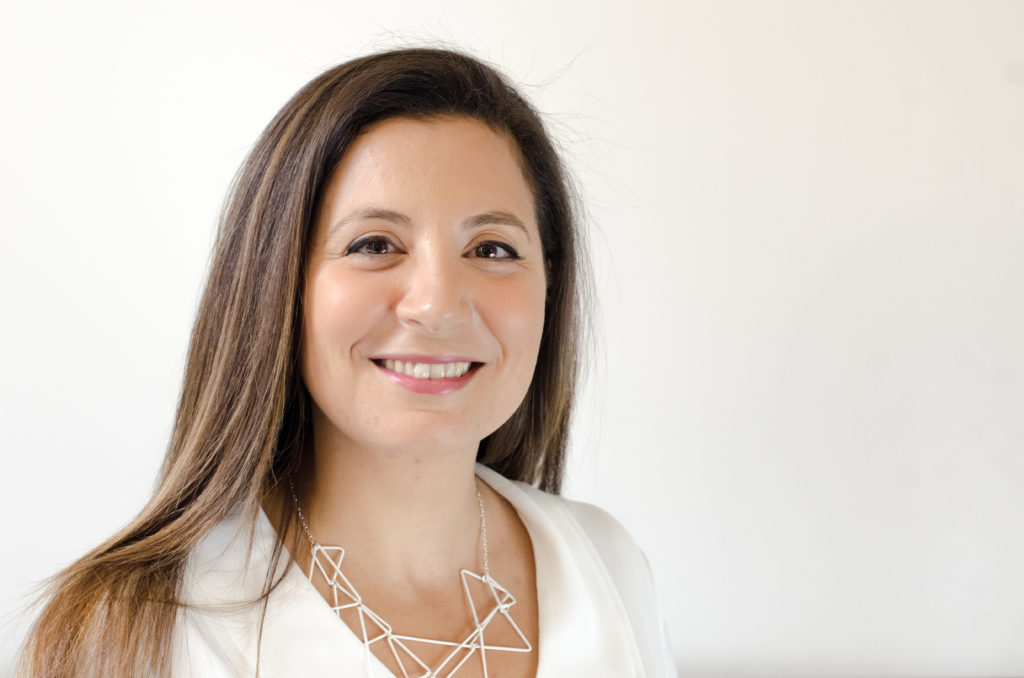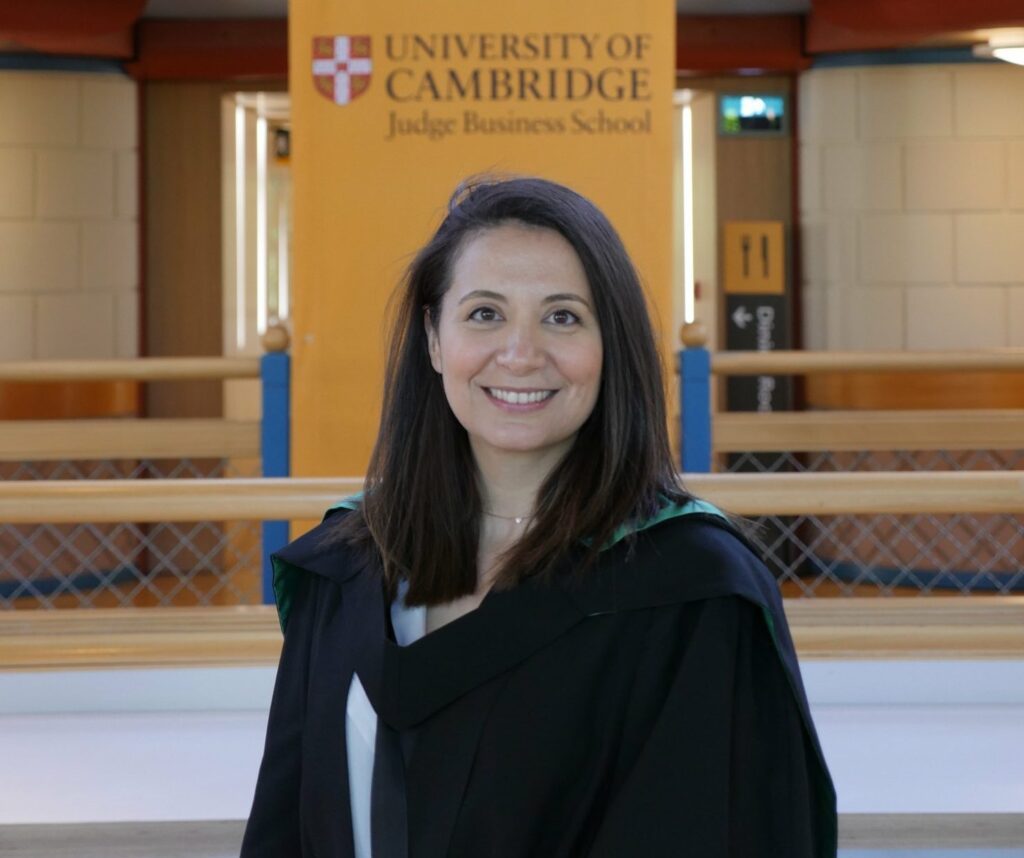Yasrine Ibnyahya (EMBA 2016) is Principal of Advanced Concepts at Inmarsat, the leading satellite communications company. A passionate advocate for innovation in the space industry, she shares with us her leadership philosophy and career journey.

You were recently recognised at the 2018 Women in Technology Series Awards for “outstanding leadership” and for cultivating an “inclusive, motivated and positive” workforce within Inmarsat. Talk us through your leadership philosophy.
Yasrine: If I try to analyse my leadership style, I would say that I value integrity, humility & ambition, listening and respecting others, and communicating (a lot!). I also try not taking myself too seriously, as I believe remaining positive and energetic is important!
I’ve often been told that my drive and determination helps everybody keep the big picture in mind but also helps the teams remaining focused while also funnelling the group creativity towards our common goals.
I’m also a doer and hard worker. I try to make things happen. Patience is not always my strength, though I’m working on it. The harder and more complex the situation is, the more enthusiastic I get about the opportunity … I try to work with those who have the best expertise on the topics while I dive into the not so obvious areas. This means I fully rely on the experts in the team, but also stay out of my comfort zone on the not well covered areas, forcing me to upskill myself on a regular basis, until I understand what is actually needed for the company to get the concept or programme forward.
How do you get the most out of your teams?
Y: I guess I adapt to the people in front of me, depending of where they are in their learning versus expertise journey, so that I can be more or less directive vs. supportive. I also try to make sure everybody has a mean of communicating their opinion that doesn’t only follow the loudest in the room (nor the last who spoke). My little personal trick is that I rarely speak first or last… I speak second!
Though I’ve managed very large teams in the past, I noticed we were more successful when working with smaller collaborative core teams where a common goal is clearly articulated, as every one of us feels accountable and comfortable to openly share their progress and challenges while also supporting the others when needed.
What was your career background prior to Inmarsat?
Y: I always knew that I wanted to work in satellite communications – even though I had very little knowledge of what a job in the space industry would look like. So, after finishing at my French high school in Morocco I went to France, studying Telecommunications Engineering at the Ecole Nationale Supérieure des Télécommunications. I wanted to have an international career, so ended up doing a double master’s degree at the University of Bristol in the UK, specialising in Communication Systems and Signal Processing. It was a great move as it opened the door for my first international job.
I had the luxury of working and living in Washington DC, being sent by a subsidiary of the National French Space Centre (CNES). There, I developed experience in satellite communication product development for maritime and environmental applications, while also managing a team of five for the first time. I discovered how to develop satellite software and hardware modules, run test campaigns, select and lead industrial partners’ activities, and get integrated in a new country, the USA!
I then moved to the UK, in a satellite subsidiary of the Airbus group called SSTL, where I was the project manager for the design and development of a 3-Tons telecommunications satellite, managing $50+ millions budget and a team of over 40 people. It was such a fascinating experience! I learnt how to change the economics of space through the development of low cost satellites. There, I got the company’s bug of taking risks (without compromising quality). This was a philosophy I always kept in mind, as once the fear of failing or being blamed is gone, you have more room for manoeuvre. Often, the blockages to exploring alternative and creative ways of doing things is in our heads.
Talk us through your current role at Inmarsat. What are you responsible for, and what are the challenges facing your sector?
Y: The space industry is very risk averse with organisations deeply rooted in their niche markets. This is not always conducive to innovation and quick change. When I joined Inmarsat, I relentlessly pursued efforts to introduce new concepts, becoming the bridge between external trends and Inmarsat’s strategic technology roadmap. I spend a lot of my time fostering innovation to create commercial and strategic opportunities, both for Inmarsat and the space industry as a whole. I’ve championed energised, fast-paced and sustainable change and over the years have become one of the company’s go-to people for assessing and introducing new ideas. Today, I am responsible for conceptualising early-stage programmes, shaping viable options – whatever the complexity – assessing their cost and risk, across space, ground and product systems concepts.
Across various technology programmes, I lead the creation of several public/private partnerships with the European Space Agency and other institutions that bring Europe to the main stage in the quest for space innovation. I raised funds for three large technology programmes supporting activities totalling more than €150m, and lead an ambitious R&D programme that required me to engage with all countries in Europe and Canada to assess the needs and capabilities of their respective space industries and match them with the Inmarsat capabilities requirements and roadmaps.
I was also the first employee to build and engage with a new ecosystem of start-ups. The objective being to introduce and track external ideas that support the development of small start-up firms and match them with Inmarsat needs. I set up partnerships with start-up incubators and organised annual hackathon. This helped me establish an internal open innovation framework which funnels the best market ideas and keeps them alive within the structured support of the company.
Earlier in my career at Inmarsat, I heavily supported the aero and maritime markets. I managed the development of Inmarsat Aviation Safety products and infrastructures – aimed at improving CO2 emissions and air traffic control management. For Maritime, I led the development of the Maritime Safety and Distress Services which provides safety of life at sea for large cargo vessels. I also invented a new generic software concept for maritime safety application which is now under final evaluation by the International Maritime Organisation regulatory body approval.
In parallel of this, I try to be an inspiration for women in the space industry. I have been a champion of women’s diversity in the workplace and I am often referred to by my male and female colleagues for coaching.

You recently graduated from the Executive MBA programme at Cambridge Judge Business School. What made you decide to pursue this programme? Why Cambridge?
Y: I had wanted to do an MBA about seven years ago… but the stars were not aligned at the time. Having built a solid technological expertise in satellite communications, it was time for me to develop a more rounded profile in finance, marketing, economy, but also deepen the areas I was passionate about such as innovation.
I chose Cambridge because of three key courses: Innovation, Strategy and Entrepreneurship. The professors on these three topics had interesting papers and on-going researches around these matters. I also found the Entrepreneurship Centre of Cambridge a valuable asset to the EMBA and I even had the opportunity to be a regular mentor and judge of early stage startups form Cambridge.
At the time of my application, I hadn’t realised the high quality of the international network – or shall I now say friendships! – Cambridge would give me access to. My cohort is made up of very talented, fascinating people! We regularly contact each other to exchange ideas on topics we can help each other on.
I also loved the fact that we are now part of the Cambridge Colleges and Judge Business School family… basically forever! We can also come back to Cambridge for “elective” classes once a year for the rest of our working life! Not only does this give us the opportunity to keep up to speed on topics related to business education, but it also allows us to see each other and meet other alumni.
How do you hope to use your EMBA experience in your future career?
Y: The whole Cambridge experience was unforgettable and will remain one of my proudest life achievements!
The EMBA experience changed the way I approach life and the way I handle both professional and personal challenges. I’ve been given all the tools and methodologies to know how to educate myself and even more importantly how to interact with others and know myself better.
Combining 13 years of professional experience in the space industry with the EMBA’s impactful network, supported by a great toolbox of business and management skills, and some curiosity and energy, I now feel totally ready to overcome and champion any opportunity, project, or cause I care about. Cambridge opened my eyes.
I hope to use these assets in a way that will increase my influence in shaping the future of the space industry. But who knows… life is also about being receptive to opportunities which may come my way… so stay tuned!


Leave a Reply